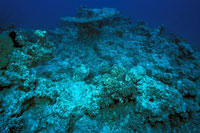
White coral skeleton, Cocos Island, Pacific Ocean. Coral bleaching is one consequence of ocean acidification. Photo: OXFORD SCIENTIFIC / GETTY IMAGE
Two recent articles suggest a grim future if ocean acidification is allowed to continue at current rates. Oceans absorb much of the carbon in the atmosphere and as we increase atmospheric CO2, the oceans grow progressively more acidic. A new study published in Science suggest that ocean acidification is now, in all likelihood, occurring faster than it has for at least 300 million years.
Sea Changes: Ocean Acidification Is Worse Than It’s Been for 300 Million Years
Why does ocean acidification matter? The UK’s Dr Jason Hall-Spencer has been studying volcanic vents in the ocean floor. These vents naturally acidify the waters around them. Dr Hall-Spencer has been documenting the effects of acidification on local life. His work suggests that suggests our oceans could lose perhaps 30% of their biodiversity within this century.
‘Jacuzzi vents’ model CO2 future
“I am investigating underwater volcanoes where carbon dioxide bubbles up like a Jacuzzi, acidifying large areas of the seabed, and we can see at these vents which types of organisms are able to thrive and which ones are most vulnerable,” he told the annual meeting of the American Association for the Advancement of Science (AAAS).
Dr Hall-Spencer treats the vents like a time machine. As he swims towards them, the pH level of the water falls and he can use particular locations to simulate what the open ocean will be like in the decades ahead if emissions of atmospheric CO2 go unchecked and much of the that gas is absorbed into sea.
“What we see as you swim along a gradient of carbon dioxide, up to levels we expect for the end of this century, is diversity loss.
“As you go along that gradient, species drop out of the system,” he told BBC News.
“It’s not all calcified species – ones with hard shells or skeletons – which drop out; there are other organisms with soft bodies which drop out as well.
“This CO2 is a stressor. Some organisms can adapt but there’re only a few species that can handle it. If I extend the gradient up to the year 2100 – that represents a 30% loss in biodiversity.”
Thanks to Alaric Bond for contributing to this post.

Here is a short video on this from NOAA:
The Acid Test | Ocean News | Ocean Today – Watch. Explore …
Scientists refer to ocean acidification as the other carbon problem. The first, of course, is global warming. People have heard about global warming for decades, but … http://oceantoday.noaa.gov/acidtest/
Of course this is only one devastating effect. Fertilizer runoff is rapidly killing coral reefs, as well as sea temp rising. In our forty years afloat, the change has been alarming. Specie decimation is rapidly on the increase, and yet, humanity can barely manage itself. A ground swell from those of us who love the sea may be its only salvation. We will post this article on our website and twitter it too.